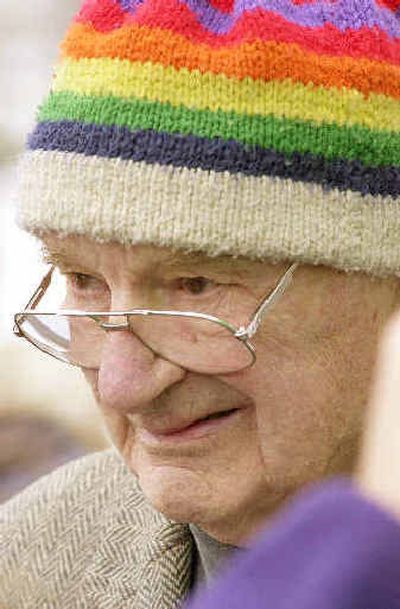Peace activist Dellinger dies at 88

David Dellinger, a lifelong and pre-eminent peace activist who was one of the “Chicago Seven” defendants after the riots at the 1968 Democratic Party convention, has died. He was 88.
Dellinger died Tuesday at a nursing home in Montpelier, Vt.
“Dave was a true hero,” said John Froines, a co-defendant in the Chicago Seven case. “He was a man who devoted his life to positive change, and he never once hesitated or stepped back.”
Through the decades, Dellinger was a stalwart in nonviolent protest beside the Rev. Martin Luther King Jr., Daniel Berrigan, Daniel Ellsberg and other leaders on the left. But he probably is best known for being one of those on trial in Chicago after the 1968 Democratic Convention.
Dellinger was in his mid-50s at the time – the “old man” of the group of radicals who faced prison after the anti-war protests they had planned during the convention turned into riots when Chicago police attacked demonstrators.
“He was a very modest man whose modesty many people took to reflect a lack of strength or will, much to their later surprise,” said Leonard Weinglass, one of the Chicago Seven’s lawyers. “When things reached a crisis in the courtroom, David was always strongly present.”
Others among the Chicago Seven were Abbie Hoffman, Jerry Rubin, Rennie Davis, Tom Hayden, Lee Weiner and Froines.
Dellinger and four co-defendants – Rubin, Hoffman, Davis and Hayden – were found guilty of crossing state lines to incite a riot, but a federal appeals court later voided the convictions.,
While the Chicago Seven trial gained Dellinger the most notoriety, it was just one event in a long life of fighting for what he thought was right. There were sit-ins at weapons plants and demonstrations against everything from the bombing of Libya to Operation Desert Storm.
As recently as three years ago, at the age of 85, Dellinger left his home in the middle of the night to take part in demonstrations in Quebec City protesting talks aimed at establishing the Free Trade Area of the Americas.
Dellinger was born Aug. 22, 1915, in Wakefield, Mass. At Yale, his father’s alma mater, he was a Phi Beta Kappa and won a scholarship to Oxford. By then, however, his life was taking a different course than what might be expected for a wealthy lawyer’s son.
While in Europe studying, Dellinger came in contact with the Loyalist troops fighting the civil war in Spain, and that moved him to later do graduate work at Yale in religious studies and also study at the Union Theological Seminary.
When the draft was established in 1940, Dellinger refused to serve in the Army, citing his pacifist beliefs. That resulted in the first of his jail terms. By the time the war was over, he had spent three years in jail for refusing to enlist.
“I received more genuine religious stimulation in prison than in the seminary,” he once said.
After the war, with many avenues closed to him, he opened a printing cooperative, the Liberation Press. During the Cold War, he became involved in a variety of leftist issues, including nuclear disarmament, prison reform, civil liberties and anti-colonialism.
In 1956, Dellinger became editor and publisher of the Liberation magazine, which provided a forum for voices of the left.
In October 1967, he was one of the organizers of the massive anti-war march on the Pentagon. He was among the many who were arrested at the rally, and he was sentenced to 30 days in jail.
Dellinger and his wife, Elizabeth Peterson, whom he married in 1942, raised five children. Eventually the couple moved to a small house in Peacham, Vt. Dellinger wrote several books, among them an autobiography, “From Yale to Jail: The Life Story of a Moral Dissenter” (1993).
His son Ray died of cancer. Dellinger is survived by his wife; sons Patchen and Daniel; daughters Natasha and Michele; and six grandchildren.